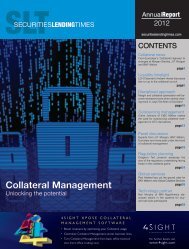read - Securities Lending Times
read - Securities Lending Times
read - Securities Lending Times
You also want an ePaper? Increase the reach of your titles
YUMPU automatically turns print PDFs into web optimized ePapers that Google loves.
NewsInBrief<br />
Charlie Marchesani, president, securities processing<br />
solutions, Broadridge, commented, “We<br />
believe that Broadridge is uniquely positioned to<br />
offer technology and outsourcing services to the<br />
hedge fund, asset management, fund administration,<br />
prime brokerage and custodial industry<br />
segments. The trust Broadridge has earned with<br />
our sell-side relationships and the neutral and<br />
independent role we hold in the industry will position<br />
us for success on the buy-side.” He added,<br />
“We proudly welcome the talented, visionary<br />
team at Paladyne. Working with Paladyne, we<br />
look forward to continuing to provide innovative<br />
solutions to existing and future clients on both<br />
the buy- and sell-sides. Paladyne Systems will<br />
operate as a core business within Broadridge’s<br />
<strong>Securities</strong> Processing Solutions division.”<br />
UK study warns on securities<br />
lending practices<br />
Research from UK-based investment firm SCM<br />
Private reveals that the practice of stock lending<br />
is widesp<strong>read</strong> within the UK retail fund management<br />
industry and warns that disclosures of<br />
those practices are inadequate.<br />
Key findings from the study show that 19 out of<br />
the 20 UK retail fund managers surveyed can<br />
lend up to 100 per cent of their clients’ funds<br />
and at least half of the total surveyed participate<br />
in stock lending. That represents £143 billion<br />
(€163.1 bn) in funds under management though<br />
not all those funds are necessarily involved in<br />
the practice.<br />
Current UK legislation, notes SCM Private, does<br />
not require retail fund managers to disclose the<br />
risks of stock lending in their investor marketing<br />
materials or to lend less than 100 per cent of<br />
their assets. Nor are there any requirements to<br />
publish daily individual stock lending exposures,<br />
names of the largest borrowers or precise composition<br />
of the collateral backing loans.<br />
“We believe that many investors will not be<br />
aware that certain retail funds are legally permitted<br />
to potentially risk 100 per cent of their<br />
savings through stock lending,” said Gina Miller,<br />
co-founder of SCM Private. “In our opinion, the<br />
minimum levels of disclosure and protection for<br />
retail investors contained within UK legislation<br />
are totally inadequate.”<br />
Blue Cross sues Wells Fargo<br />
Blue Cross and Blue Shield of Minnesota and other<br />
institutional investors launched a suit against<br />
Wells Fargo in Minnesota federal court, accusing<br />
the financial services company of grossly mismanaging<br />
their investments in its securities lending<br />
programme, according to Law360.<br />
A spokeswoman for Wells Fargo released the<br />
following statement to SLT: “Wells Fargo categorically<br />
denies the allegations made in this<br />
lawsuit and will vigorously defend against them.<br />
The investments made by Wells Fargo on behalf<br />
of clients in the securities lending programme<br />
were in accordance with investment guidelines,<br />
and were highly rated and suitable at the time of<br />
purchase. As with all investments, the investors<br />
bear the risk of their investment losses. Wells<br />
Fargo continues to act with clients’ best interests<br />
in mind and strives to provide exceptional<br />
customer service at all times.”<br />
A Blue Cross and Blue Shield of Minnesota<br />
spokeswoman said the organisation will not be<br />
issuing a statement, as it is their practice not to<br />
comment on litigation.<br />
Plaintiffs are represented by Robins, Kaplan,<br />
Miller & Ciresi, according to Law360. The law<br />
firm could not be reached for comment.<br />
Advent of CCPs “arouse a passion”<br />
in asset managers - Finadium<br />
Emergence of CCPs is among the most controversial<br />
developments in the securities lending<br />
markets, according to the 2011 Finadium survey<br />
of Leading Asset Managers on <strong>Securities</strong> <strong>Lending</strong>,<br />
Collateral Management and Custody.<br />
Central Credit Counterparties (CCPs) take what<br />
was once a bilateral trade and centralise the<br />
counterparty risk in one AAA-rated entity. CCPs<br />
do not, however, eliminate risk but rather mutualise<br />
it across a group of participating members,<br />
banks or broker-dealers.<br />
“The topic of CCPs tends to arouse a passion<br />
in educated asset managers because of the<br />
change they represent, the level of control they<br />
take away from...decision-making and the potential<br />
impact on revenues,” wrote Josh Galper,<br />
managing principal at Finadium and author of<br />
the report.<br />
“The risk offset of mitigating counterparty default<br />
does not appear to make up for what could be<br />
lost; this is a change from last year when managers<br />
appeared to be more positive about the<br />
potential of CCPs,” he added.<br />
The survey found that most managers, at 57 per<br />
cent, prefer their current bilateral counterparties<br />
while 17 per cent are indifferent to whether they<br />
are exposed to bilateral or CCP credit risk. A minority<br />
of nine per cent prefers the CCP model<br />
while the last 17 per cent state they do not have<br />
enough information to express a clear desire<br />
either way.<br />
CCPs are being boosted by a variety of global<br />
regulatory requirements coming into force to<br />
promote transparency. Basel III, for example,<br />
states that any transactions cleared via a CCP<br />
do not require any allocation of capital.<br />
As it is early days, volumes in this space are<br />
still low. SecFinex, the first live centrally cleared<br />
multi-lateral trading facility (MTF) for the securities<br />
lending market in Asia, Europe and the US -<br />
estimates it has between $300 to 400 million on<br />
loan and $1.2 billion of liquidity on a daily basis.<br />
But the MTF, which works with LCH.Clearnet<br />
and Six-x clear for clearing services, is looking<br />
to treble or quadruple that over the next year as<br />
regulation drives trades onto exchanges.<br />
In the Finadium survey, a North American securities<br />
lending manager commented: “Any<br />
time you introduce a new middleman there are<br />
more mouths to feed. While there is some risk<br />
mitigation with a CCP we prefer to manage that<br />
risk ourselves.”<br />
European short selling interest<br />
at year low<br />
Short sellers in the European equity markets<br />
have been lying low since August’s volatility, according<br />
to Data Explorers.<br />
A Regulated Equity Finance Exchange<br />
Offering Security Futures EFPs which are economically equivalent to OTC Swaps,<br />
Repos and <strong>Securities</strong> <strong>Lending</strong> transactions cleared through AA+ rated OCC.<br />
OneChicago LLC, 141 West Jackson, Chicago, IL 60604 :: (312) 424-8520 :: www.onechicago.com<br />
Follow us on Twitter: @OneChicago<br />
4<br />
www.securitieslendingtimes.com












